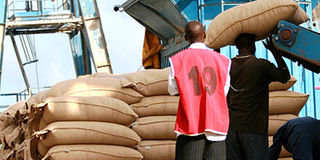Maize import fiasco threat to food security

Workers loading imported maize at the Mombasa port in the past. PHOTO | FILE | NATION MEDIA GROUP
What you need to know:
Uganda has a comparative advantage at producing maize than any other country in the region.
Farmers do not comprise those in the Rift Valley, or cultivating maize, alone; Kenya has other crops.
Kenya is self-sufficient in milk and processing firms need to factor in value addition.
Kenya’s maize imports, especially from the neighbouring countries, specifically Uganda, have grown exponentially, but what exactly has perpetuated this scenario?
Uganda has a comparative advantage at producing maize than any other country in the region, which, in essence, means that it has the ability to produce the cereal at a lower cost than Kenya.
Maize is not a staple food in Uganda — as clearly demonstrated by the country's maize balance sheet. The consumption component only takes a small proportion of the production, which mainly covers learning institutions, military and correctional facilities as well as hospitals. The general populace does not, therefore, consume maize as much, giving the country the luxury to export the surplus.
In recent times, Uganda has registered a 78 per cent increase in maize exports to Kenya, going by the statistics at the country's Ministry of Agriculture.
This has been boosted by organised arrangements.
SOURCE FOR MARKETS
For instance, the Eastern African Grain Council (EAGC) has organised Ugandan farmers into groups, facilitates collection points and arranges for sellers and buyers to meet, as well sources for markets.
It, therefore, makes commercial sense for Kenyan traders to buy maize from Uganda and re-sell it to the government through the national strategic grain reserves.
That creates a conducive environment for cartels to flourish and deprive genuine farmers of the opportunity to earn an income and improve their standards of living by doing business with the government.
Agriculture is at the heart of the common mwananchi — hence the rationale for having it in the 'Big Four' agenda.
Therefore, to avoid a situation in which food security is threatened, there is a need for serious policy and institutional reorganisation of the agricultural sector to eliminate the cartels.
DO BUSINESS WITH FARMERS
The government ought to do business with farmers. It should come up with a way to identify genuine farmers and facilitate the vulnerable group through an arrangement that will see their maize bought and factored into the strategic reserves.
Also, enhance prudential measures in agricultural agencies to ensure prompt payments to farmers, and avoid pilferage, especially of fertiliser, which is eventually sold in the neighbouring countries.
Lastly, farmers do not comprise those in the Rift Valley, or cultivating maize, alone; Kenya has other crops. Therefore, there is a need to urgently to re-examine various policies affecting them.
For instance, in macadamia farming, some processing plants have been given preferential treatment, shutting out others for allegedly selling raw nuts, leaving a few to export the produce, hence demotivation.
Another aspect, especially in the dairy sector, is how to have a milk surplus. Kenya is self-sufficient in milk and, therefore, processing firms need to factor in value addition. Milk powder can be processed and stored for future eventualities to avoid importation during drought.
Mr Njoroge is an economics and policy analysis lecturer at Karatina University's School of Business. [email protected]





